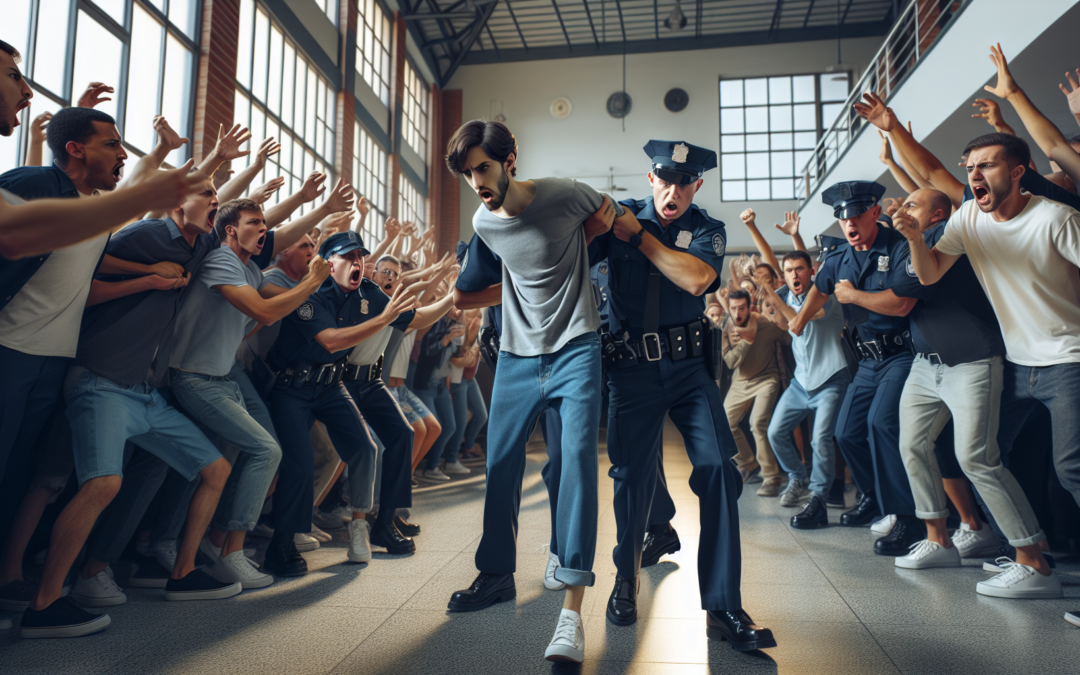Navigating The Thin Blue Line: A Law Enforcement Perspective on Public Audits
In an era where every action of law enforcement is dissected under a magnifying glass, the recent saga involving James Freeman, an ardent practitioner of civics audits, demands attention. Freeman’s activities have sparked debate but have also cast a critical light on the day-to-day challenges faced by officers, further complicating an already demanding vocation.
The Role of Law Enforcement in Civic Engagement
For police officers, the call to serve and protect is not just a mission statement but a way of life. They operate at the intersection of ensuring security and respecting civil liberties. The crux of their challenge lies in managing fluid situations with composure, professionalism, and respect for the law. Under such pressure, the visit from Freeman was the latest in a series of real-world tests facing the thin blue line.
Officers are increasingly navigating encounters initiated by so-called auditors—individuals who often operate with a confrontational approach under the guise of exercising their First Amendment rights. These encounters are designed less to foster genuine civic engagement and more to precipitate a reaction that can be captured on camera, edited, and distributed to online audiences eager for content that confirms preconceived narratives.
Freeman’s presence illuminated an uncomfortable truth: that while the law protects the right to free speech, it also strives to uphold a semblance of order and civility. It’s a delicate dance that law enforcement must perform, balancing transparency with the need to maintain safety for all. The stakes are undeniably high, with the potential repercussions of any perceived misstep well documented and quickly disseminated through platforms like YouTube and Facebook.
Officers’ Perspective: Between Rights and Duties
James Freeman’s attempts to record and broadcast his visit inherently questioned the protocols and the boundaries of accessibility in spaces traditionally deemed secure. Yet, for officers on the front lines, there lies the perpetual pressure of making split-second decisions. Are such audits an encroachment or a legitimate inquisitive endeavor? This conundrum challenges daily law enforcement duties, often forcing individuals entrusted with authority to react under intense scrutiny.
To many in law enforcement, situations like Freeman’s bring a heightened awareness of how perceptions can overshadow intentions. The vilification of police perceived as overreaching or oppressive is visceral for officers devoted to doing right by their communities. Each call to action presents a looming hazard—misinterpretation, which can erode public trust and escalate into conflict.
Let’s not forget that the law enforcement community is populated by individuals who pursued their careers with noble intentions. Their aim has always been to make neighborhoods safer and uphold justice. However, good intentions often meet harsh realities, including the portrayal of officers as aggressors—a narrative clung to by auditors like Freeman. In these situations, compassion, empathy, and fairness are indispensable tools that guide officers in diffusing tense situations before they spiral beyond control.
A Notion of Resilience Amidst Criticism
Faced with increasing public audits and assorted challenges, there is now a more stringent standard applied to those in uniform. This everpresent challenge tests their decades-honed resilience. Yet, signaling a retreat from duty is not an option for many who pledge loyalty to their badge before they ever wear it. It’s a matter of faith, dedication, and, frankly, optimism.
James Freeman’s video recordings may cast a shadow, but for every camera lens fixed to highlight a perceived failure, there are countless moments of heroism undocumented and unsung. As with the retelling of any event, perspective shapes narrative. Audiences consumed with videos designed to stir provocation are riveted to unfolding dramas that often blur genuine dialogue about maintaining both security and liberty.
Empowering Through Training and Community Outreach
Forces must adapt, investing more into de-escalation training, where officers learn to respond to spontaneous provocations preparedly, not reactively. The embrace of transparency through body cameras has proven valuable in counter-textualizing uninformed public judgments.
Beyond technological tools, investing in genuine community outreach builds bridges of trust preemptively, dissolving misunderstanding slowly but surely. Citizens should understand that efforts like Freeman’s, should they remain unchecked, risk upending the public’s safety for which officers are ultimately responsible. Clarity, communication, and cooperation among stakeholders foster environments where both accountability and harmony thrive—a system to benefit society as a whole.
Concluding Thoughts: Striving Towards a Shared Understanding
At its core, the spectacle involving James Freeman underscores a pressing need for nuanced discourse regarding civil liberties and law enforcement methodologies in difficult moments. To those watching from afar, involved only virtually, it is easy to echo slogans that romanticize the defiance of civic norms.
Yet, for those standing in the crosshairs of scrutiny amid ongoing audits, the call for dialogue backed by mutual understanding rather than virulent confrontation cannot be more urgent. For the officers who navigate this complex terrain daily, the path forward relies on both perspective and resolve.
For additional insights and updates on challenges faced by law enforcement, tune in to The John Ligato Show, as voices from all sides seek solutions amid the noise.

Recent Comments